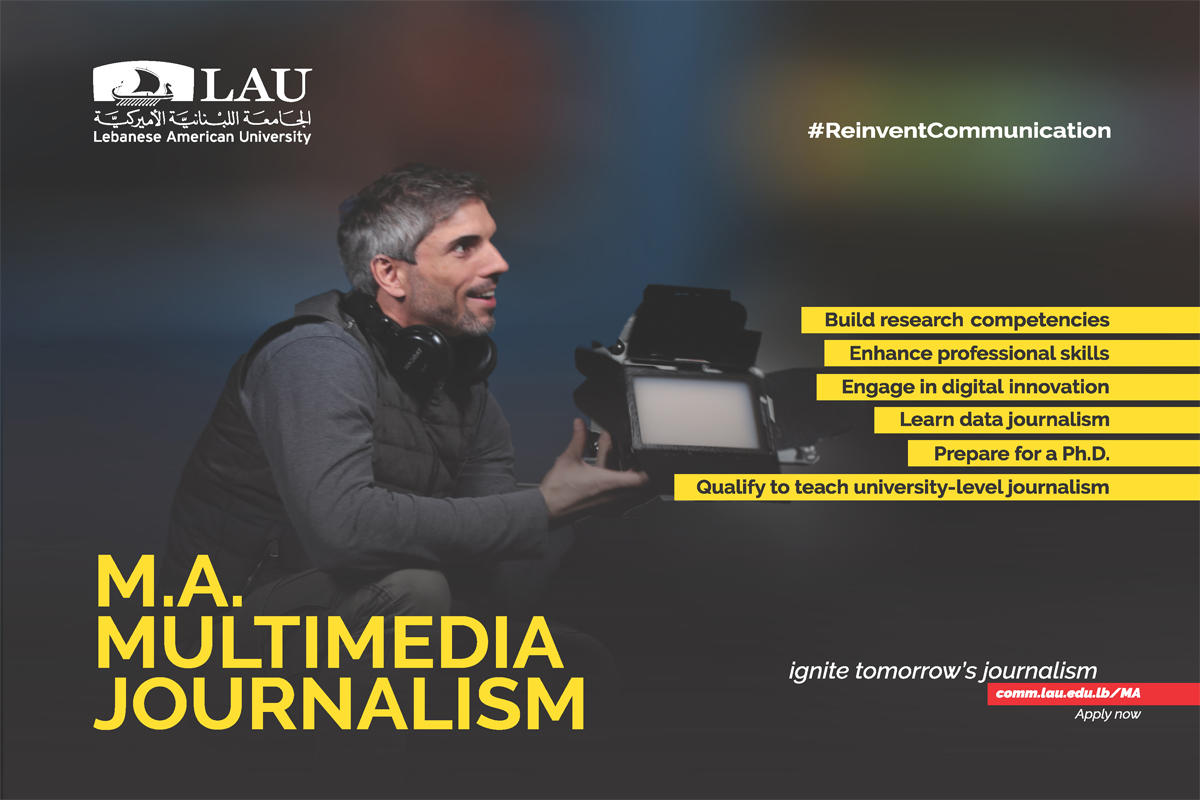MA in Multimedia Journalism: Innovative Education with a Vision
New program elevates journalism as a profession in Lebanon and the region.
The Department of Communication Arts is launching an MA in Multimedia Journalism that focuses on digital innovation and research, and also offers an apprenticeship for journalists interested in teaching at the university level.
“Our MA in Multimedia Journalism equips students for the new world of digital media and innovation, while also building their theoretical knowledge and research skills,” said Associate Professor and Communication Arts Chairperson Jad Melki.
Furthermore, he added, “because many journalists end up teaching at the university or pursuing their PhDs later, the program also trains students in curricular development and effective teaching, and prepares them for doctoral studies.”
The program integrates into its teaching methods the Department of Communication Arts’ four pedagogical pillars: research, theory, professional practice, and critical inquiry. Through a two-track emphasis – research or professional – it targets both trained journalists interested in advancing their careers in media teaching and research, and fresh graduates who want to break into the digital media industry.
In their first year, students take common courses on multimedia journalism, digital innovation, data journalism, and media research methods. Elective courses include web development for media professionals, global media literacy, and advanced digital illustration techniques, among others.
Based on their emphasis, in their second year, students in the professional track focus on professional courses, undergo an internship and submit a senior journalism project. Those in the research track attend theoretical and research courses, and complete a research apprenticeship that culminates with a thesis.
The MA offers scholarships in the form of graduate assistantships, during which students not only benefit from a significant tuition reduction, but also get to work on research, teaching, and digital production tasks with faculty in the department.
Assistant Professor of Multimedia Journalism Claudia Kozman said that while the two tracks have distinct objectives, there are commonalities. “The goal of the MA is to equip students with digital skills to create innovative journalistic stories that have a strong base in theory and research,” said Dr. Kozman, who will be teaching courses on communication and media theory, as well as media pedagogy.
While there are other graduate media programs in the country, Dr. Melki said they are “either overly theoretical with no practical components, or tend to be outdated and focus on obsolete media practices.” This is where the department’s vision to “reinvent communication” translates in the new MA, he continued.
“We try to bring to the classroom the latest technologies in journalistic production and media research and push students to further imagine the future of journalism.”
Research is a distinctive component of the program, considering the rising global interest in Arab media. “Unfortunately, most of that research is conducted from outside the Arab region, often by scholars who know little about our societies, histories or politics, and often with an orientalist frame,” Dr. Melki said. In that sense, international students interested in media in the Arab world will find their niche in the program and can build a network of media professionals and scholars from the region.
With the idea of boosting local media research capacity, students, Dr. Kozman said, will develop skills in scientific research to generate rigorous studies, in addition to producing capable instructors invested in student learning. “This track is the ultimate preparation for academia, whether students only want to teach or continue their studies in a doctoral program.”
In addition to research and professional journalism, the department decided to go a step further and cater to the needs of journalists aspiring to teach media.
According to Dr. Melki, many full-time journalists teach part-time at universities and schools without having prior pedagogical training. The idea of a teaching apprenticeship brought forth a collaboration with the Department of Education for a co-taught course in media pedagogy that students in both tracks are required to take.
The ultimate aim of the program, Dr. Melki added, is not only to hone students’ teaching skills, but also to move toward the “elevation of the level of journalism education and teaching in the region.”
Applications for fall 2019 are now open with an early deadline of January 28 and a regular deadline of March 30.
